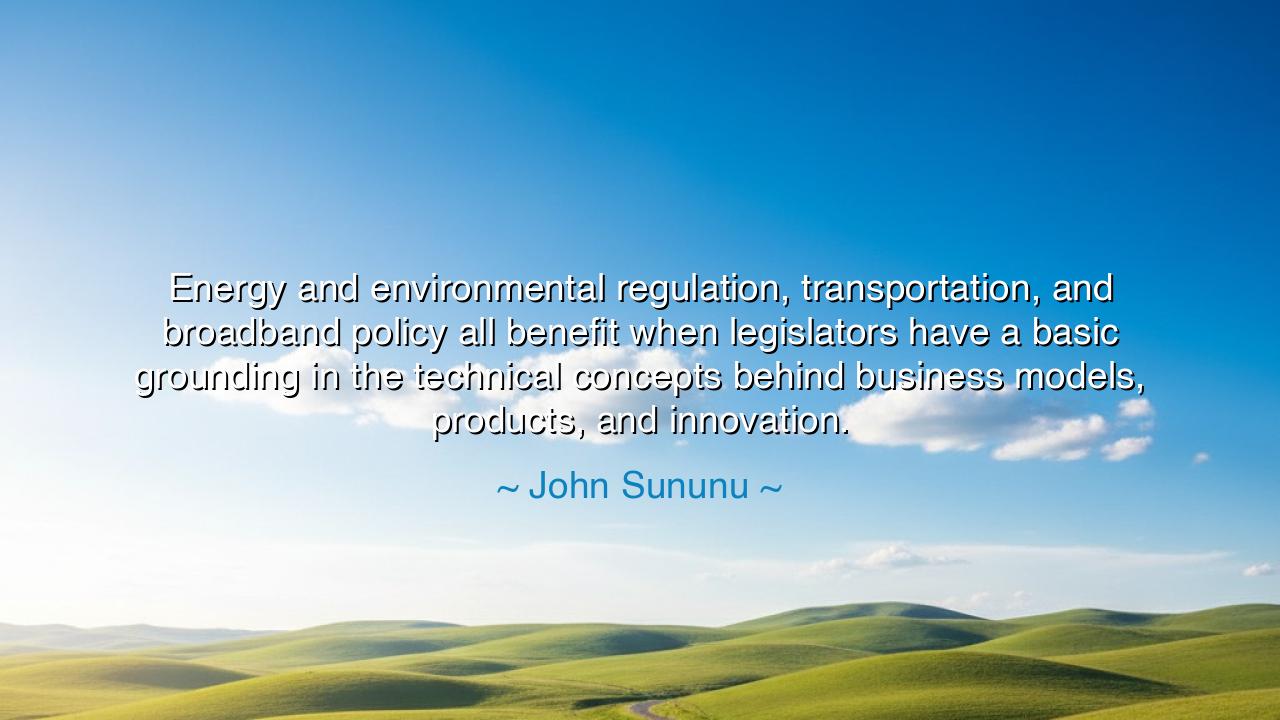
Energy and environmental regulation, transportation, and
Energy and environmental regulation, transportation, and broadband policy all benefit when legislators have a basic grounding in the technical concepts behind business models, products, and innovation.






John Sununu, with the clarity of a seasoned statesman, once declared: “Energy and environmental regulation, transportation, and broadband policy all benefit when legislators have a basic grounding in the technical concepts behind business models, products, and innovation.” These words are not mere counsel to politicians; they are a warning to all societies that drift into ignorance. For Sununu unveils a timeless truth: governance without understanding is blind, and blind governance leads nations into folly. Just as a physician must know the workings of the body to heal, so too must lawmakers grasp the sinews of technology and commerce if they are to craft wise laws.
The meaning of this saying lies in the union of wisdom and knowledge. Laws written without comprehension of technical concepts are like maps drawn by those who have never seen the land—they mislead, they confuse, and they hinder progress. In fields as vital as energy, environmental stewardship, and transportation, ignorance can sow disaster. A ruler may mean well, but if he cannot distinguish between what is possible and what is fantasy, between what builds and what breaks, his decisions may choke growth or poison the earth. Sununu reminds us that justice demands not only moral intent, but intellectual preparation.
The origin of this insight rests in the modern age, when the pace of innovation has outrun the grasp of many who govern. Sununu himself, trained as an engineer, saw firsthand how often legislation lagged behind technology. He knew that broadband policy, for example, could shape the future of entire communities—yet too many leaders lacked even a basic grasp of how networks functioned, or how business models determined access. His words are thus a plea: let those who govern study, learn, and understand, lest their ignorance become the nation’s chain.
History provides us with vivid examples. Consider the building of the transcontinental railroad in the United States. It was not enough to have political will; legislators needed at least a basic understanding of engineering, finance, and logistics. Where they lacked such insight, corruption and waste flourished. But where wisdom prevailed, the iron road was laid, binding a continent together and reshaping the destiny of a nation. This story mirrors Sununu’s warning: without knowledge, policy falters; with knowledge, it uplifts generations.
There is an emotional force within his words, for they speak to the gap between those who govern and those who build. Too often, innovators labor with brilliance, only to see their efforts hampered by poorly designed laws. Too often, the people suffer because their leaders legislate in ignorance, treating complex systems with the simplicity of a child. Sununu’s call is not only for competence, but for respect—respect for the intricacies of human endeavor, respect for the work of engineers, scientists, and builders, and respect for truth itself.
To future generations, this teaching bears both warning and hope. The warning is that societies which fail to unite knowledge with governance will falter. They will craft laws that stifle progress, mismanage resources, and deepen inequality. The hope is that by seeking grounding in technical concepts, leaders can guide wisely, crafting policies that harness innovation for the common good. This is not a task for legislators alone, but for all citizens, who must demand competence from those who rule, and seek understanding in their own lives.
The lesson is plain: do not scorn knowledge, but pursue it. If you are called to lead, learn the foundations of the fields you govern. If you are called to follow, hold your leaders accountable to this standard. Practically, this means embracing education in science and technology, fostering dialogue between innovators and lawmakers, and remembering always that wisdom requires more than good intention—it requires understanding.
Thus, John Sununu’s words ring as a guiding fire: “Energy and environmental regulation, transportation, and broadband policy all benefit when legislators have a basic grounding in the technical concepts behind business models, products, and innovation.” Let the rulers of tomorrow heed this counsel, lest ignorance become their downfall. And let all people learn, for in learning lies the path not only to progress, but to freedom itself.






AAdministratorAdministrator
Welcome, honored guests. Please leave a comment, we will respond soon